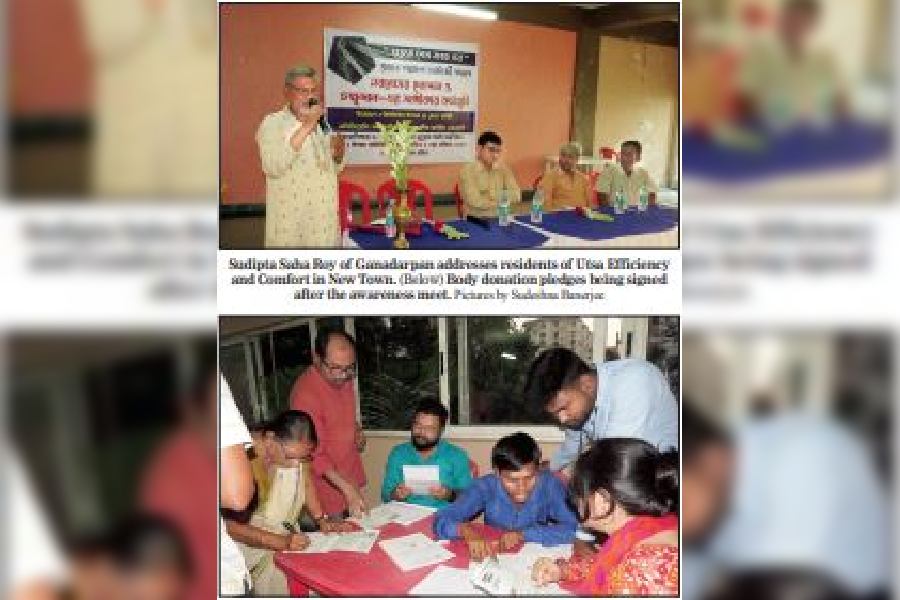Three changes in the existing system can push up the number of body donations taking place currently in the state. Ganadarpan, a social organisation that has been working since 1985 specifically to motivate individuals to donate their bodies to medical science after their death, has been raising this demand with the government authorities. But even as another Organ Donation Day passed by on August 13, there has been no change in the status quo.
The issue was broached by Sudipta Saha Roy, general secretary of Ganadarpan, at a programme at Utsa in Action Area I to raise awareness about the need for and process of body donation. The programme had been organised by New Town Utsab O Mela Committee and Utsa Efficiency and Comfort Cooperative Housing Society.
Declaration of brainstem death has been made mandatory in Tamil Nadu and Maharashtra. Though a discussion had started in Bengal, there has been no order to that effect yet. “Even for patients on ventilator, doctors here usually wait till cardiac arrest and declare that as cause of death. There is no attempt to declare brain death immediately when that happens. If that is done, then an attempt can be made to harvest his organs by putting the brain-dead patient on heart-lung machine and asking the relatives of the patient for their consent,” said Saha Roy.
Brain death has to be assessed and announced by three government-empanelled doctors, one of whom has to be a neurosurgeon. The process is supervised by the State Organ and Tissue Transplant Organisation.
Only those who suffer from brainstem death can donate organs. If the death is due to cardio respiratory failure, then organs are not fit to be harvested. “Even then, the tissues can be donated. The biggest example is cornea which needs to be collected within six hours of death,” said Saha Roy.
Getting the death certificate late can hamper the process of cornea collection. Saha Roy pointed to a government order dated August 24, 1999 that allowed hospitals to hasten the handover of a death certificate in case the person had pledged eye donation. “That would give the cornea collection team at the Regional Institute of Ophthalmology, Susrut Eye Hospital and Research Centre or Prova Eye Bank, whichever is contacted, ample time to come.”
Other tissues can also be donated, like skin, ear drum, veins and even one’s hands (see box). “Skin donations are highly useful for treatment of burn victims,” he pointed out.
Another problem that impedes body donation is the fact that there is no mechanism to hand over a body outside the scheduled hours. “Earlier, the doms who stayed on the hospital campus, used to collect the body from the patient’s kin whatever be the time of night or day. But now, they do not do so after 4pm. So the window for body donation is 10am to 4pm at the government teaching hospitals. If a death takes place any later, then the body has to be preserved overnight at hearses like Peace Heaven or Peace World for donation to take place the next day.”
Ganadarpan has been petitioning the health department so that body donation can be done round the clock in all the government hospitals.
The other change that would benefit the organ donation movement, if it is effected by lawmakers, is presuming consent. “This means all individuals will be presumed to be willing to donate their bodies posthumously. If anyone is unwilling, there would be a provision to opt out by writing to the National Registry. Unless that objection is recorded, one’s consent would be presumed,” he said.
Consent is presumed by law in several European countries like Spain, Austria and England, he pointed out. “So the number of transplants is obviously higher in those countries.”
India now follows the principle of explicit consent, which is why people are encouraged to pledge their body for posthumous donation in writing
He also advised donors to make at least one family member one of the two witnesses to the donation pledge. “That way, the family would be aware of the pledge as they would be the ones to raise an alert when the person dies.”
He pointed out how lack of co-operation from a family can scupper a donation. “A celebrated Bengali author and his wife had both pledged their bodies but when he died, his son, who returned from abroad, refused to allow the donation to take place. The wife told us that she was ashamed but nothing could be done and he was cremated instead.”
Health centre opens in CE Block
An urban health and wellness centre opened in CE Block, New Town, on Monday. It has a doctor, a nurse and a paramedic staffer on duty from 11am to 3pm.
“We now have five health centres in operation in New Town which have so far treated close to 40,000 people. In a scenario where general physicians who are supposed to be the first port of call in case of basic ailments, like fever or indigestion, are missing in most neighbourhoods, forcing patients to rush to specialists from the start, here a doctor can guide you and that too without fees,” an NKDA official said.
Dengue tests are being done free of cost at Urban Primary Health Centre 1 at Akankha crossing, he added.
